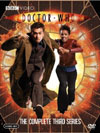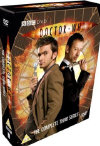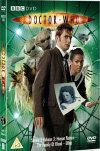DVD Extras (box sets only) include:
And the excellence begins to shine through once past the mandatory hook. Our protagonist Mr. Smith has a very excellent and well-paced character scene with Miss Joan Redfern early on, with actors David Tennant and Jessica Hynes exhibiting an infectiously fun chemistry. After that, scene after scene of fascinating character depth and intriguing plot elements continue, demonstrating excellent writing and pulled off with the kind of audio-visual success that classic stories are made of. Beautiful stuff. The antagonist forces are shrouded in complete mystery as the story opens, and enjoy several high-quality story beats of being investigated by the curious. The minimalist visuals of their craft are particularly superb and beautiful - well done. Our protagonists also get great introductions for both of their personas, and the TARDIS gets a fantastic introductory sequence during Martha's first return to the vehicle, clearly establishing the interior/exterior relationship. Subsequent returns to the vehicle continue to include the kind of brief but important establishing shots that put many original 1980's story edits to shame. Nice job. There's no satisfying materialization anywhere in this tale to start things off right, but with this adventure's particularly unique and gripping opening structure, you won't care about that one bit.
The scarecrows are a particularly excellent addition to the story - creepy, mysterious, and providing the kind of en-masse threat that big stories utilize well. Like most other members on the production team, I also find it strange that no one had thought of using scarecrows on Doctor Who before.... except maybe Pip and Jane Baker for a throwaway scene in "The Mark of the Rani" (story no. 140). It seems so obvious a good idea. "Human Nature" racks up more points for scarecrows. Of course the thinkers in the audience may well wonder how it is that scarecrows wind up moving about and doing the villains' bidding, particularly as they are just straw and clothes with no robotics whatsoever. Listen carefully, or you may miss the critical technobabble phrase "molecular fringe animation", whatever that means. Sounds a bit empty for satisfying believability, but then the Family of Blood also seem a bit non-physical and adept at animating leftover carcasses with their own personas, so it does seem like something they'd be good at, even if they can't explain it very well. The Family of Blood themselves seem to come from a species mysterious and unknown enough to deserve a lot more investigation than they receive when all is said and done. Their planet of origin and overall population would be good information, as the Doctor's strategy seems to imply that there won't be any more of them in the neighbourhood after this family has expired. Yes, more info would have been great for added depth of culture and character, but isn't terribly necessary as we still get interesting, disturbing characters that can hold our attention well.
The Nature StratagemsThe middle portions of the story offer a successful and satisfying set of escalating stratagems between opposing forces that we are invested in, yet they seem to work best merely on the surface, threatening to expose more unanswered questions if looked into with greater depth. The early subtle intrigue at the school leads expertly to the confrontation at the dance, followed by a good chase, and culminating in a shotgun stand-off that delivers most of the need vs. barrier material that these sequences require to be successful. But partly because this defense is prompted by John Smith instead of the Doctor, the protagonists' goals are less rooted in idealistic strategies and more in character complications, as evidenced when a check of his value-system causes Smith to abandon his methods. And perhaps because the shootouts have drawn so much of our attention, it's not as easy to notice that no believable reason is given for Smith to be able to run away with the rest of the school instead of having to give himself up to the attackers.It is also unclear how common little bullets would interfere with "molecular fringe animation" enough to stop scarecrows exactly as they stop men, considering that scarecrows are not even phased when having their whole arm ripped off. Ultimately scarecrows are not very central to the plot of this story, and were perhaps added a little too hastily to get all the bugs worked out of their interactions. But the biggest character questions are for the full Gallifreyan Doctor himself, and seem to harken back to the Sylvester McCoy era which probably still reigned in people's minds when Cornell wrote the original book upon which this story is based. The Doctor (and to some extent Martha as well) seem to know the villains so well that they don't need to explore them, and should have a strategy in place that can safely counter all those so-predictable enemy moves. If the true Doctor himself can beat these villains so easily, why did he hide and disguise himself in the first place? (Note these are essentially cowardly behaviours that humanity is evolving away from as we move into Fourth Density.) Some attempt is made to say that he was trying to be kind to the villains - preferring to let them expire quietly at the end of their natural life cycles instead of actively doing something to them. Fair enough. But this plan also had the contingency to restore the Doctor in case the villains showed up. So why does he whisper from the watch to Tim Latimer to keep himself in hiding while the villains go on a murderous rampage? Surely that would be a time to show greater kindness to the citizens of 1913 England? And this nagging question undermines all the scarecrow action and shoot-'em-ups, preventing full investment in the stratagems of the middle act.
"On a Whim"You may not notice the Doctor's motivational plot-hole the first time through the middle act, but Joan Redfern is very sharp and eloquent in pointing it out in a key emotional concluding scene, making the callous God-playing aspect of the Doctor's character more obvious on subsequent viewing, and bringing up questions of whether he really did come up with the best strategy for dealing with the villains from the outset. Several improvements come to mind: either lose the know-all McCoy era plans and have the Doctor develop his strategy while investigating the enemy and gathering key clues about their nature as the story unfolds, or perhaps even easier to graft onto the story we have, perhaps the Doctor himself hesitates to come back because he doesn't want to break Smith's connection with Joan.In any case, Joan asks a very poignant question of the Doctor at the end of the story, and the Doctor keeps silent and has to walk away. I think the story might be better off as a whole if the Doctor could offer some kind of response to that question - perhaps not to Joan in that moment, or perhaps something apologetic rather than in defense of the strategy that Joan has so expertly shot down. The Doctor can make mistakes like anyone, and his character is better off by showing he can learn from them. By not answering Joan's question for the audience, it seems he still thinks he was right, and it's pretty hard to see how that was the case based on the information we have. While the bulk of the scenes making up the conclusion work wonderfully and deal with the most pressing issues and plots of the story, particularly the final confrontational dialogue scene between hero and villain, there are a few that I think don't serve the story as well as a scene answering Joan's question for the audience would have. The poetic narration that accompanies the what-happens-to-the-villains sequence seems out of place, and gives their final defeat by the Doctor the ease which hurts his original callously ineffective plan. But even more out-of-place seems to be all the "Remembrance Day" imagery and its lead-up with First World War philosophy and events. In short, Paul Cornell's writing in both this story and "Father's Day" (story no. 167) betrays an unhealthily strong pre-occupation with martyrdom. On one hand, there is enough evidence throughout the story to indicate that its makers believe that war, and the First World War in particular, was a senseless waste - a poor strategy that world leaders pushed their populations into. Whatever the strategic faults of the scarecrow shoot-up scene might have been, it still earns thematic points in that regard. Yet on the other hand, this story's makers seem to want to celebrate the sacrifices made in that war, diluting their anti-war sentiment with not just one but THREE major Tim Latimer scenes packed together at the end of the story, until the ending has you scratching your head wondering why they suddenly changed direction at the last minute, or what it was that they really wanted to say all along. Strange also that Smith doesn't see himself as merely one splinter of the Doctor's (half-human?) personality, who will once more be whole when integrating with the rest of himself. He sees himself completely separate from the Doctor, as someone who will cease to exist when the Doctor comes back. He, and Cornell, see his necessary action as a sacrifice. Sadly unenlightened, says my intellect, but very nicely dealt with on the emotional level by the characters and by the final encouragement allowing them to be at peace with their choices. The Doctor almost becomes a metaphor for the timeless soul each human has, and Smith's fear of rejoining that soul becomes a perfect echo of the usual fear of returning to the soul state of self through death. A most typically human response indeed.
"Travel With Me"Several other lasting impressions are important to note here. First is the option the Doctor gives Joan of joining him in the TARDIS, because as has been the case over the past two years, my desire to see guest characters like Joan Redfern, Ida Scott, Reinette, Mickey, Sarah Jane Smith, K9, Lynda with a "y", and Gwynyth join the Doctor in the TARDIS is typically much greater than any desire for the companions like Rose and Martha that he ends up settling for. Even Pauline Collins' appearance in "Tooth and Claw" (story no. 173) brought equally strong memories of guest character Samantha Briggs who was another great companion choice that didn't happen back in the sixties. Strange also that the only guest companion that I didn't particularly want to come on board the TARDIS - Donna Noble - is the one they eventually went with for season 30. It's just too weird. Whoever is developing companion characters for this show these days must be missing something in their equation.
International Titles:Deutsch: "Die Natur des Menschen"
Magyar: "Emberbőrben"
Français: "Smith, la Montre et le Docteur"
Русский: "Человеческая природа"
Italiano: "Natura umana"
This story has become available on DVD. Click on the Amazon symbol for the location nearest you for pricing and availability:
Note: The full season sets contain commentaries, behind-the-scenes featurettes, and other extras. The smaller volumes only feature the plain episodes. Comments on this article are welcome. You may contact the author from this page:
|









